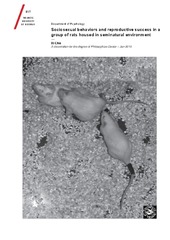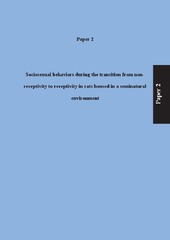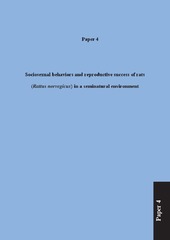| dc.contributor.advisor | Ågmo, Anders | |
| dc.contributor.author | Chu, Xi | |
| dc.date.accessioned | 2018-03-07T08:39:16Z | |
| dc.date.available | 2018-03-07T08:39:16Z | |
| dc.date.issued | 2015-04-20 | |
| dc.description.abstract | Wild rats employ a rather extensive area for their daily activities and share elaborate burrows with tunnel and chambers. When a female enters estrus, she will copulate with multiple males during the entire period of estrus. In a typical laboratory setting, rat sexual behavior is studied in pairs of opposite sex individuals. Apparently the experimental studies have been performed in this highly artificial setting is with low or no ecological validity. Thereby, we initiated systematic examinations of the behavioral effects of male and female in an ecologically valid context. Five groups of 4 intact cycling females and 3 intact males living in a seminatural environment (consisting of a big open area and complex burrow system) for a period of 8 days were used in this study. Sociosexual activities were recoded and analyzed from the beginning of the behavioral estrus until the end of it. During this period, female was sexually receptive to every male mount and showed no significant partner preference or avoidance to a particular male. Males and females copulate simultaneously in a rather random way. The sexual behavior of both sexes changes abruptly in the transition periods from nonreceptivity to receptivity and vice versa. Male did not mount on female before the first lordosis and after the last of her behavioral estrus. Females hardly displayed paracopulatory behavior (darting, running and ear wiggling), and male pursuit of females was very low outside of behavioral estrus. Instead of ejaculatory series, male behavior was observed in copulatory bout. The intensity of male sociosexual interaction is stable throughout the copulatory bout. Female sexual behavior was irrelevant of number of offspring, yet males with more intromissions and ejaculations achieved greater reproductive success. Both mount frequency and non-sexual interactions were unrelated to male fertility as well as the order of ejaculations did not determine reproductive advantage. Male and female preferences slightly influenced fertility in rats. Dominance in male showed no impact in reproductive success. Sexual events occurred mainly in the open area and social events in the burrow. | en_US |
| dc.description.doctoraltype | ph.d. | en_US |
| dc.description.popularabstract | People may always doubt whether they choose their sexual partners carefully enough. A PhD project undertaken from 2010 at the Department of Psychology, University of Tromsø may help us to discover the fact of partner selection in sex. By observing the behavior of group of rats in a seminatural environment, a great amount of useful information is provided which may help us to understand the possible partner selection pattern and whether this pattern may influence the fertility. | en_US |
| dc.description.sponsorship | All studies in this thesis were carried out at university of Tromsø, Norway, and the financial support was received from the Faculty of Health Sciences, University of Tromsø. | en_US |
| dc.description | The papers 1 and 3 of this thesis are not available in Munin. <br>
Paper 1: Chu, X. & Ågmo, A. (2014). Sociosexual behaviours in cycling, intact female rats (Rattus norvegicus) housed in a seminatural environment. Available in <a href=https://doi.org/10.1163/1568539X-00003177> Behaviour, 151(8), 1143 – 1184. </a>
<br>
Paper 3: Chu, X., & Ågmo, A. (2015). Sociosexual behaviors of male rats (Rattus norvegicus) in a seminatural environment. Available in <a href=http://dx.doi.org/10.1037/a0038722> Journal of Comparative Psychology, 129(2), 132-144. </a> | en_US |
| dc.identifier.uri | https://hdl.handle.net/10037/12274 | |
| dc.language.iso | eng | en_US |
| dc.publisher | UiT The Arctic University of Norway | en_US |
| dc.publisher | UiT Norges arktiske universitet | en_US |
| dc.rights.accessRights | openAccess | en_US |
| dc.rights.holder | Copyright 2015 The Author(s) | |
| dc.subject.courseID | DOKTOR-003 | en_US |
| dc.subject | VDP::Social science: 200::Psychology: 260::Biological psychology: 261 | en_US |
| dc.subject | VDP::Samfunnsvitenskap: 200::Psykologi: 260::Biologisk psykologi: 261 | en_US |
| dc.title | Sociosexual behaviors and reproductive success in a group of rats housed in seminatural environment | en_US |
| dc.type | Doctoral thesis | en_US |
| dc.type | Doktorgradsavhandling | en_US |


 English
English norsk
norsk

